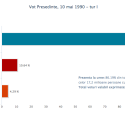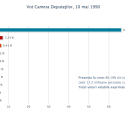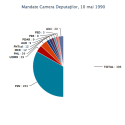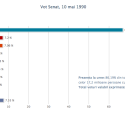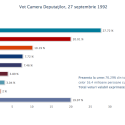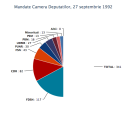IMPORTANT DEVELOPMENTS
- 1. ECONOMY. Romgaz in listed on the stock exchange in Bucharest and London.
- 2. Politics. The PSD holds its National Council.
- 3. Economy. The Government decided to increase the minimum wage, after negotiations with the IMF.
- 4. ECONOMY. Economic experts confirm the effectiveness of the measures of the Ponta Government.
- 5. Politics. Victor Ponta – the favorite for the position of president.
- 6. DECENTRALIZATION. The Government will assume responsibility for the decentralization law.
1. Romgaz in listed on the stock exchange in Bucharest and London
Prime Minister Victor Ponta was in London, where he attended the listing of Romgaz on the stock exchange. The PM stressed that the Romgaz listing on the BSE and the London Stock Exchange is an important success for the development of the Capital Market in Romania and Romania itself. Victor Ponta said that we are talking about a historical listing – it is the highest bid of a Romanian company. It is the first time when Romania appears on the radar of global institutional investors with an offer of shares.
Government officials stressed that it is a very successful transaction, with a price located in the upper limit of the offer, which places the value of Romgaz way ahead of comparable companies in Central and Eastern Europe. They opined also that this success shows investors’ confidence in the company and in its management, as well as in the proper implementation of the program of liberalization of gas prices, adopted by Romania in 2012.
To meet this strong demand from Romanian investors, the Ponta Government decided to increase the retail installment from 15% to 20% and provide more for the Romanian investors, who have shown such support for one of the flagship companies of Romania. The listing on the Bucharest stock exchange and the Global Depositary Certificates in London have created an unprecedented demand for an offer of shares in Romania, stimulating oversubscription of the institutional installment from the first week of trading.
The Prime Minister also welcomed the strong support from high quality international investors (BERD), including some that have not yet invested in Romania, considering their involvement as a serious sign of confidence in the Romanian economy.
2. The PSD holds its National Council
The PSD National Council reunion was held at the Palace Hall in Bucharest, over 4,200 delegates and representatives of the party’s leadership being present. The agenda was approved by the Executive Committee of the PSD that met the day before at the Palace of the Parliament, while more than 1,500 Social-Democrats have been present before at discussions on specialized workshops.
PSD President, Victor Ponta, said at the PSD National Council reunion that the primary objective is to „heal” and „sooth” the society, urging the party representatives to find resources „for the final victory.”
„I think that after so many years of division, after so many years of war, we are in a time when we need peace, in a time when we need to build. Daily, I try to prove the capacity for dialogue, for tolerance. (…) I assert once more that the fundamental objective that I will pursue, as long as I take a leadership position in the party and in state structures, is to heal, to soothe a society torn by political wars in the past ten years, to rebuild what has been broken in all this time, to put unity instead of division, solidarity instead of selfishness and individualism, dialogue where there was confrontation and tolerance where there was hated. I really think that this is what Romania needs and I want to ask you to join me in this effort that we must do to regain normality and peace”, said Victor Ponta.
Also, Victor Ponta conveyed to the Social-Democrats present at the Palace Hall that the European Parliament elections in 2014 will be „the moment of truth” and will show „how powerful the party is”. At the same time, the Social-Democrat leader warned those who „will not succeed” that they will have to assume this responsibility.
The Honorary President of PSD, Ion liescu was not present at the Council due to some health issues, but sent instead a short video message in which he expressed his regret that he could not take part in the meeting. Ion Iliescu considers that it would be a good thing for Romania and for Romanians if the USL would operate until the elections in 2016.
„For Romania and for Romanians it would be a good thing if the USL would work until the proposed deadline, that is, until the 2016 parliamentary elections. Personal egos and small wars do not have any place, or any meaning in the USL. The War of declarations is also useless, undesirable. We have some accountability to the Romanians and we must assume them with full responsibility”, the former head of state stressed, in his message on the occasion of the National Council of PSD.
The Honorary President of PSD mentioned that PSD needs strengthening its leftist identity, and its traditional values of solidarity, equity, and social justice, as well as other values such as environmental protection or strengthening the civic spirit. Ion Iliescu added that PSD must win the European Parliament elections in „a convincing manner.”
The National Council of PSD passed a Resolution supporting the current President of the European Parliament, Martin Schulz, at the Presidency of the European Commission. According to the document, through his policy experience and constant involvement in defending the European citizens’ right to a decent life in a democratic society, Martin Schulz is the most significant exponent of the Social-Democrats fight for a solidary and progressive Europe.
Moreover, the National Council of PSD calls for the entire Romanian society, asking it to firmly reject all attempts to achieve any political, economic and social objectives through violence, it said in a Resolution on the Council’s agenda.
„We need social peace, in order to achieve the goals of economic development and to improve the lives of all the Romanians, to give Romania the future it deserves. We need dialogue, national and social reconciliation, cooperation and solidarity, in order to surpass current difficulties and return to normality”, reads the Resolution regarding PSD’s ideological identity.
3. The Government decided to increase the minimum wage, after negotiations with the IMF
Next year, the Government will take into account the increase of the minimum wage in two stages, namely to 850 RON from January 1 and to 900 RON starting July 1, 2014, the PM Victor Ponta announced.
„Regarding the minimum wage, we will take into account its increase to 850 from January 1 and to 900 RON, starting July 1. We, also, have a salary increase fund in the budget. There will not be an equal increase for all employees, but a targeted increase for specific categories: we will continue negotiations to establish the degree to which the salaries of resident doctors, junior teachers and other categories will increase, upon which, even in situations of a budgetary shrinkage, we need to take decisions for increase in 2014”, said Victor Ponta.
The Prime Minister Victor Ponta also said that „all pensions will be indexed at a rate of 3.76%”.
At the same time, the head of the Executive assured that the reduction of social security contributions (CAS) is a „political commitment” that the Government will fulfill.
„The fact that we included in the Memorandum the very clear intention to reduce the social security contributions with a significant 5%, from July 1, is a political commitment that we will meet, as we met all of them at a time„, said Victor Ponta, early in the Government session.
PM Victor Ponta announced also that the salaries for teachers and resident doctors will increase by a two-digit percentage. Thus, the salaries of junior teachers and resident doctors will increase by at least 10%.
4. The economic experts confirm the effectiveness of the measures of the Ponta Government
The Governor of the National Bank of Romania, Mugur Isarescu, said that the fiscal measures negotiated by the Government with the IMF will not lead to an „avalanche of price increases,” this being a taboo of the Romanian society. Also, Adrian Vasilescu, the adviser to the BNR governor, said that the impact of the measures agreed by the Ponta Government with the IMF Ponta will be minimal.
„According to our preliminary data and first evaluations based on models for which we have this, the impact (note: tax measures announced by the Government) is limited to somewhere around 0.2% and the chain consequences are also limited (…) we do not see at all an avalanche of price increases, chain increases. These are our taboos for the past 20 years. The impact is limited. Some corrections were expected, either on the expenditure side or on the revenue side. Eventually, the Government decided to go on both”, said Mugur Isarescu.
Adrian Vasilescu, the adviser to the BNR governor, said that the impact of the measures agreed by the Ponta Government with the IMF will be minimal, and that the Government’s commitment to tax special constructions, such as poles, chimneys or impoundments are viable solutions.
„It is the most viable (solution), because such targets can really be achieved. We have problems with cashing fees. For example, the VAT. Many companies hide the added values and therefore they do not present themselves at the „counter” to pay the Value Added Tax. While such goals are in sight and they will be taxed exactly, taxes will be collected”, said Adrian Vasilescu.
Moreover, Adrian Vasilescu appreciates that the impact of the new agreement with the IMF will be minimal. „Everyone immediately makes a connection between such measures and the inflation rate and the press was a little sore, starting from the idea that we will see what will happen in 2014; high inflation, how the prices will raise. Well, the National Bank did some calculations and analyzes. The governor stressed very clearly that the impact on inflation will be 0.2%, and those chain consequences will be minimal (…). The impact will be minimal”.
5. Victor Ponta – the favorite for the position of president
A CSCI survey data conducted between 28-31 October, on a representative sample with a 3% margin of error, shows that Victor Ponta is the politician whom Romanians trust the most (40% of the respondents said they had more confidence in the PSD president). The PM is followed by the Liberal leader, Crin Antonescu (25%), Mihai-Razvan Ungureanu (22%), Catalin Predoiu (16%) and Elena Udrea (15%).
PSD is still the most important political actor, 41% of the respondents declared their support for the Social-Democrats in the perspective of the European Parliament elections. PSD is followed by PNL, attracting 20% of the vote, respectively PDL (18%). UDMR would receive 5% of the vote, while PPDD is preferred by 4% of voters. People’s Movement, as well as PRM relies on the support of 3% of voters, while PC and ADA are preferred by 2% of respondents.
In terms of voter preferences for President, Victor Ponta would be preferred by 32% of voters. Crin Antonescu is the preferred choice of 25% of voting citizens, while Mihai-Razvan Ungureanu would receive, assuming a candidacy to the supreme office, the votes of 20% of voters. Catalin Predoiu is preferred by 9% of voters, and Elena Udrea would receive 8% of the vote.
In a possible second round of Presidential elections, Victor Ponta would defeat any of his potential opponents. Against Crin Antonescu, the PSD President would get 52% of the vote, against Elena Udrea, 67% of the vote, while against former Prime Minister Mihai-Razvan Ungureanu, Victor Ponta would receive a vote of 64% of the participants. Crin Antonescu remains as favorite in front of Elena Udrea (a difference of 20%) and Mihai-Razvan Ungureanu, from whom a 10% advantage would separate him.
6. The Government will assume responsibility for the decentralization law
PM Victor Ponta announced in the weekly meeting of the Government, that the Executive will approve the decentralization law, and will submit it to the Parliament.
„I want to finish, in informal sessions with every minister, our two key projects, namely the budget, and submit it to the Parliament on the 14th, and the decentralization, which will also be sent in Parliament on the 14th”, said Victor Ponta.
The Prime Minister said previously that „we have established very clear – the Government liability commitment will be on the bill regarding decentralization of those institutions, which now lie in the subordination of ministries and will be moved to county councils or local councils. But it will surely be until the 20th (note November) at the latest”.
The Minister Nicolae Banicioiu also said the county Youth and Sports directions will move, through the process of decentralization, to county councils. In his opinion, through decentralization, the entire process will be simplified and more efficient. „Rather than sending a letter or do come I don’t know how many times to Bucharest from all counties in Romanian, to wait to get to a director that will not have enough time for everyone, it is much simpler to have your work and everything regarding a decision at the county level, which means less roads and more efficiency”, he said.
Deputy PM, Liviu Dragnea, said that he plans to introduce in the project on decentralization a provision which states that changing the destination of a building could be done by a Government Decision.
„No land can be alienated, so that any property that is transferred by this law mandatory retains its destination. It’s not only the ports, but any building small, large, land, building, sports complex, camp, will not be permitted to change its destination, except in well-grounded cases, and we are going to introduce it in law by Government Decision, to have a definitely high safety”, said Liviu Dragnea.



